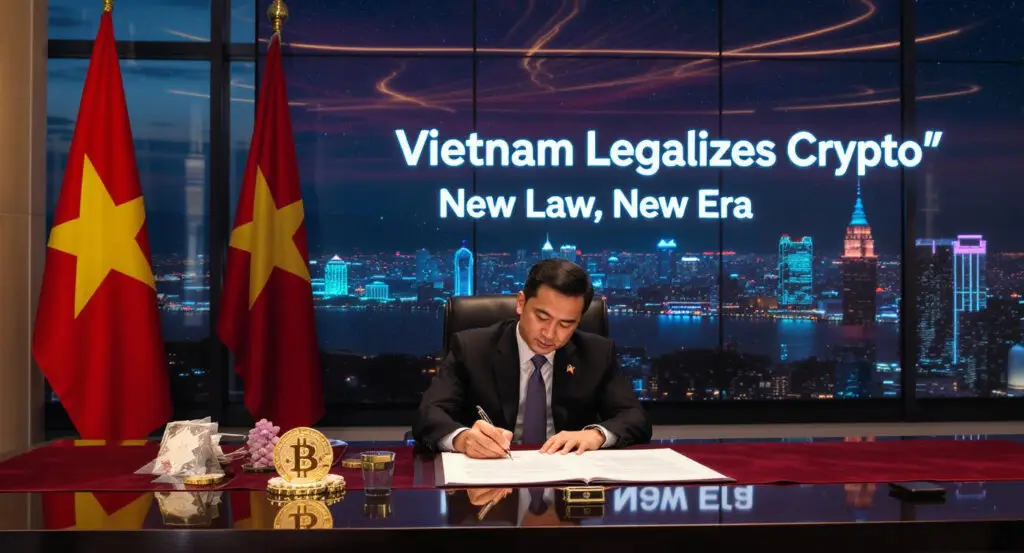In a landmark move set to reshape its financial landscape, Vietnam has officially passed a new law that legalizes Bitcoin and other crypto assets. Effective January 1, 2026, this legislation marks a significant national recognition of cryptocurrencies, a first for the country, according to local media reports. The law meticulously distinguishes between virtual assets and crypto assets, crucially opting not to classify them as securities, digital currencies, or other conventional financial assets. This categorization aims to foster greater transparency and order in Vietnam’s rapidly expanding crypto world, signaling a positive outlook for investors and enthusiasts alike.
Defining the Digital Realm: Virtual vs. Crypto Assets
Vietnam’s newly approved law introduces a clear distinction between virtual assets and crypto assets. Virtual assets are broadly defined as a form of digital asset used for exchange or investment, without necessarily relying on encryption for validation. In contrast, crypto assets are specifically defined as digital assets that depend on encryption technology to validate transactions and ownership, aligning with how major cryptocurrencies like Bitcoin and Ethereum function. This precise categorization is a foundational step towards building a robust regulatory framework, ensuring clarity for market participants and enabling tailored oversight for different types of digital assets.
Paving the Way for a Digital-First Economy
Beyond simply legalizing cryptocurrencies, Vietnam’s new law demonstrates a broader commitment to becoming a digital-first economy. The legislation actively promotes the integration of blockchain and artificial intelligence (AI) across various sectors. This strategic embrace of cutting-edge technologies is designed to propel Vietnam forward in the global digital landscape, fostering innovation, attracting foreign investment, and cultivating a tech-savvy workforce.
Bolstering AML Efforts and International Standing
A critical aspect of Vietnam’s new crypto law is its strong alignment with international anti-money laundering (AML) requirements. This proactive measure is a clear indication of Vietnam’s commitment to enhancing its relationship with the Financial Action Task Force (FATF). By implementing stricter compliance with cybersecurity and AML standards through this new law, Vietnam is optimistic about being removed from the FATF’s watchlist, which would significantly improve its standing in the global financial community and potentially unlock new international investment opportunities.
What This Means for Vietnamese Investors
For investors within Vietnam, this new law brings much-anticipated clarity and legitimacy to the crypto market. The official recognition of these assets by the government could lead to increased participation from both retail and institutional investors who may have previously been hesitant due to regulatory uncertainty. This legal framework is expected to foster a more secure and predictable environment for trading, holding, and innovating with digital assets. It also sets the stage for new financial products and services to emerge within a regulated space.
A Foundation for Future Regulation
While the law does not present a comprehensive regulatory framework at this point, it is widely regarded as a solid basis for further development. This initial legal recognition is a crucial first step, providing a necessary foundation upon which more detailed rules and guidelines can be built. The Vietnamese authorities have adopted a forward-thinking approach, opting for a phased regulatory evolution rather than a restrictive, all-encompassing framework from the outset. This incremental strategy allows for adaptation to the rapidly changing nature of the digital asset space while maintaining a degree of control.
Vietnam Joins Global Crypto Trendsetters
Vietnam’s decision to legalize and define crypto assets places it among a growing number of nations actively considering or adopting digital currencies. This move signals a recognition that the future of finance is increasingly digital and that a clear regulatory stance is crucial for participation in the global digital economy. The country’s action is part of a broader global trend, with other nations like Ukraine reportedly considering a Strategic Bitcoin Reserve and Pakistan contemplating similar initiatives. This burgeoning international interest underscores the escalating global competition to lead in digital asset innovation and integration, with Vietnam making a bold statement with its comprehensive new law.























